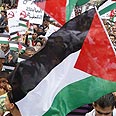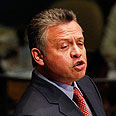

Thousands of Jordanians rallied on Friday to call for a boycott of upcoming legislative elections, a challenge to King Abdullah II who has promoted a parliament-centered reform process to stave off an Arab Spring uprising in his country.
The protest in downtown Amman was the largest in nearly 22 months of weekly protests in Jordan. It is meant to show that the king's critics can push for change through the streets, rather than through a legislature that critics say in its current form is too beholden to the monarchy.
Related articles:
- Jordan's king dissolves parliament ahead of elections
Jordanian tribe slams new Israel envoy
Jordan names new envoy to Israel
The demonstration came a day after Abdullah dissolved parliament half-way through its four-year term, setting the stage for new elections. No date is set yet for the polls, but they are expected at the end of this year or early in 2013.
Jordan at present is in little danger of seeing mass upheaval, such as that which toppled regimes in Egypt and other Arab countries in 2011. Protests are usually peaceful, and well within the ability of the security forces to contain. Most in the opposition remain loyal to the king, pressing for reforms but not advocating the removal of the monarchy.
In the latest rally, Hammam Saeed of the Muslim Brotherhood group insisted on the need for an election boycott in a speech to 7,000 protesters, including fellow Islamists, leftists, and members of other movements. Police sealed off the area.
"We will not reverse our boycott of the elections," Saeed shouted. Protesters chanted, "Abdullah, listen well: We want freedom, not your royal favors."
Electoral law at root of contention
The main point of contention is over an election law enacted three months ago, allowing each eligible voter two ballots, including one for a nationwide party list, instead of a single ballot cast for a candidate running in a district.
The party list system favors larger coalitions with an ideological agenda such as the Islamists, while the district-based system tends to return tribal pro-government candidates who muster local support from their particular clan and relatives.
The government treated the two-ballot system as a concession to the opposition. But the Brotherhood and others say that it does not go far enough, and that the elections will result in an ineffective parliament filled with palace loyalists.
"The reforms are cosmetic and will only lead to a docile parliament, like the previous successive legislatures we had," a bearded Saeed roared through a loudspeaker.
The Brotherhood insists on an older election law from 1989, which allowed Jordanians multiple ballots and saw the Brotherhood at the time win almost half of the seats.
Jordan has weathered 18 months of street protests calling for a wider public say in politics, partially by curtailing the absolute powers of the king. The protests have been small and mild compared to mass uprisings elsewhere in the region.
Under pressure, Abdullah changed 42 articles, or one-third of Jordan's 60-year-old constitution, giving parliament a say in forming Cabinets – a task which used to be his sole prerogative.
He also created a constitutional court to monitor the application of the law and an independent electoral commission to supervise the vote, taking over the role from the Interior Ministry.
Other moves included a political party law that encourages a multiparty system, a municipality law that allows Jordanians to govern their towns by electing mayors and city councils, and reforms allowing a teachers union to be formed for the first time ever.
- Receive Ynetnews updates
directly to your desktop















